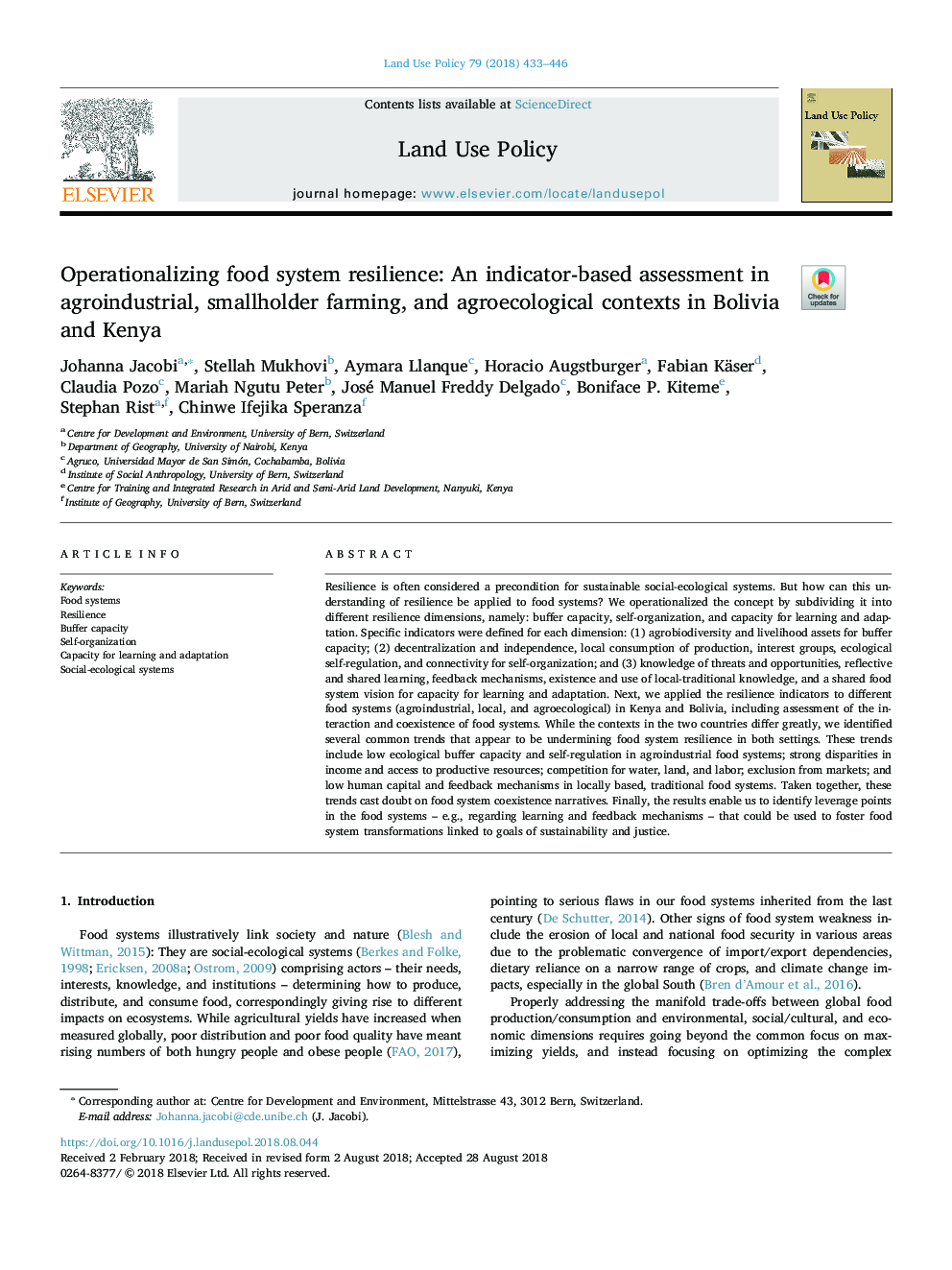| کد مقاله | کد نشریه | سال انتشار | مقاله انگلیسی | نسخه تمام متن |
|---|---|---|---|---|
| 11000083 | 1421804 | 2018 | 14 صفحه PDF | دانلود رایگان |
عنوان انگلیسی مقاله ISI
Operationalizing food system resilience: An indicator-based assessment in agroindustrial, smallholder farming, and agroecological contexts in Bolivia and Kenya
ترجمه فارسی عنوان
انعطاف پذیری عملیات سیستم غذایی: ارزیابی مبتنی بر شاخص در صنایع کشاورزی، مالداری و محیط زیست در بولیوی و کنیا
دانلود مقاله + سفارش ترجمه
دانلود مقاله ISI انگلیسی
رایگان برای ایرانیان
کلمات کلیدی
سیستم های غذایی، انعطاف پذیری، ظرفیت بافر، خود سازمان، ظرفیت یادگیری و انطباق، سیستم های اجتماعی-زیست محیطی،
ترجمه چکیده
انعطاف پذیری اغلب به عنوان پیش شرطی برای سیستم های پایدار اجتماعی-محیطی درنظر گرفته می شود. اما چگونه این درک از انعطاف پذیری را می توان به سیستم های غذایی اعمال کرد؟ ما مفهوم را با تقسیم کردن آن به ابعاد مختلف انعطاف پذیری، یعنی ظرفیت بافر، خودسازماندهی و ظرفیت یادگیری و انطباق، عملی کردیم. شاخص های خاص برای هر بعد تعریف شد: (1) تنوع زیستی زراعی و دارایی های معیشت برای ظرفیت بافر؛ (2) تمرکززدایی و استقلال، مصرف محلی تولید، گروه های علاقه، خودمراقبت زیست محیطی، و قابلیت اتصال به خودسازی؛ و (3) آگاهی از تهدیدها و فرصت ها، یادگیری بازتابنده و مشترک، مکانیسم های بازخورد، وجود و استفاده از دانش محلی محلی و یک دیدگاه سیستم غذایی مشترک برای ظرفیت یادگیری و سازگاری. بعد، شاخص های انعطاف پذیری را در سیستم های مختلف غذا (کشاورزی، صنعتی، محلی و کشاورزی) در کنیا و بولیوی اعمال کردیم، از جمله ارزیابی تعامل و همزیستی سیستم های غذایی. در حالی که شرایط در دو کشور بسیار متفاوت است، ما چندین رویکرد مشترک را کشف کردیم که به نظر میرسد انعطاف پذیری سیستم غذا را در هر دو حالت مختل می کند. این روند شامل ظرفیت بافر کم محیط زیست و خود تنظیم در سیستم های غذائی صنایع غذایی است. تفاوت های شدید در درآمد و دسترسی به منابع مولد؛ رقابت برای آب، زمین و کار؛ خروج از بازار؛ و کمترین سرمایه انسانی و مکانیزم بازخورد در سیستم های غذای سنتی مبتنی بر محلی است. در کنار هم، این روندها به روایات همزیستی سیستم غذا شک می کنند. در نهایت، نتایج ما را قادر می سازد تا نقاط اهرم را در سیستم های غذا شناسایی کنیم، مثلا در مورد مکانیزم های یادگیری و بازخورد، که می تواند مورد استفاده قرار گیرد تا تغییرات سیستم غذا را مرتبط با اهداف پایداری و عدالت ایجاد کند.
موضوعات مرتبط
علوم زیستی و بیوفناوری
علوم کشاورزی و بیولوژیک
جنگلداری
چکیده انگلیسی
Resilience is often considered a precondition for sustainable social-ecological systems. But how can this understanding of resilience be applied to food systems? We operationalized the concept by subdividing it into different resilience dimensions, namely: buffer capacity, self-organization, and capacity for learning and adaptation. Specific indicators were defined for each dimension: (1) agrobiodiversity and livelihood assets for buffer capacity; (2) decentralization and independence, local consumption of production, interest groups, ecological self-regulation, and connectivity for self-organization; and (3) knowledge of threats and opportunities, reflective and shared learning, feedback mechanisms, existence and use of local-traditional knowledge, and a shared food system vision for capacity for learning and adaptation. Next, we applied the resilience indicators to different food systems (agroindustrial, local, and agroecological) in Kenya and Bolivia, including assessment of the interaction and coexistence of food systems. While the contexts in the two countries differ greatly, we identified several common trends that appear to be undermining food system resilience in both settings. These trends include low ecological buffer capacity and self-regulation in agroindustrial food systems; strong disparities in income and access to productive resources; competition for water, land, and labor; exclusion from markets; and low human capital and feedback mechanisms in locally based, traditional food systems. Taken together, these trends cast doubt on food system coexistence narratives. Finally, the results enable us to identify leverage points in the food systems - e.g., regarding learning and feedback mechanisms - that could be used to foster food system transformations linked to goals of sustainability and justice.
ناشر
Database: Elsevier - ScienceDirect (ساینس دایرکت)
Journal: Land Use Policy - Volume 79, December 2018, Pages 433-446
Journal: Land Use Policy - Volume 79, December 2018, Pages 433-446
نویسندگان
Johanna Jacobi, Stellah Mukhovi, Aymara Llanque, Horacio Augstburger, Fabian Käser, Claudia Pozo, Mariah Ngutu Peter, José Manuel Freddy Delgado, Boniface P. Kiteme, Stephan Rist, Chinwe Ifejika Speranza,
